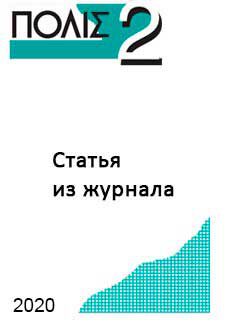Online shop of "Polis. Political Studies" Journal
We in the world, the world in us
Martynov M.Yu., Fadeyeva L.A., Gaberkorn A.I. Patriotism as Political Discourse in Contemporary Russia. – Polis. Political Studies. 2020. No. 2. P. 109-121. (In Russ.).
Free!
patriotism, civic identity, public discourse, symbolic policy, political struggle.
The authors characterize patriotism not only as an academic concept but as a method of political argument articulation. Academic discourse is analyzed on the basis of the idea of concept circulation. The article is based on identity studies, with patriotism understood as a form of identity which is constructed by pluralities of actors and the highly competitive character of its process. The authors characterize the struggle for interpreting patriotism and identifying patriots in public discourse and the media in Russia today. They consider that state actors and pro-government publicists are dominant, but not the only actors of constructing patriotism. Analyzing the understanding of patriotism in public opinion, the authors notice that patriotic consciousness and feelings are not the direct result of symbolic policy influence. They have a more or less high level of independence despite such influence. The problems with the conceptualization of patriotism are connected with the disputable nature of the concept and, more importantly, with its political content. In the authors’ opinion, patriotism is seen as a political attitude, although it includes love for the Motherland as an emotional component. This political attitude is the self-identification of people as citizens of a state, whose institutions, in their view, are in the public interest. Thus, the political functions of patriotism are associated with the legitimationdelegitimation of the power and the formation of identity. This is why the struggle for the identification of patriotism is so hot. In framework the delegitimation of power, the significance of patriotism could rise, but accompanied with the search for another political actor as its subject. The authors consider the rise of patriotic discourse and the ever-stronger struggle for the identification of patriotism in political processes of the near-future. Important marks were demonstrated in July-August 2019, when the participants of protests used the Constitution and flag of the Russian Federation as propaganda tools.
 English
English Русский
Русский

Reviews
There are no reviews yet.